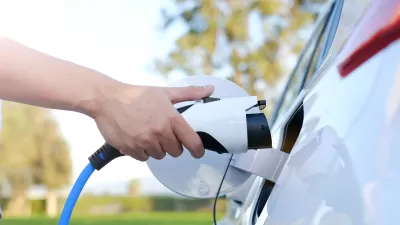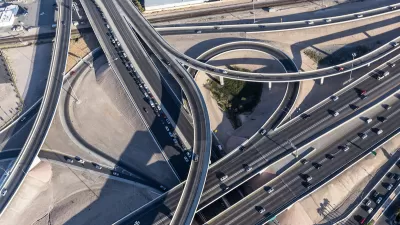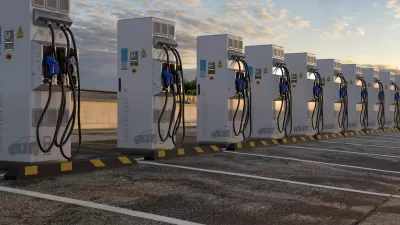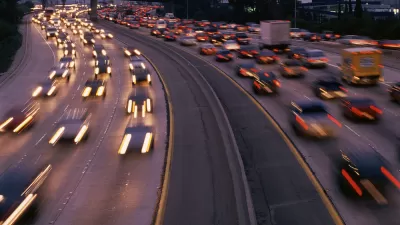The inverse relationship between electric vehicle sales and gasoline tax revenues has caused the federal government and many states to investigate mileage fees as an alternative funding option to fuel taxes. Iowa is going a different route.

Since the beginning of July, electric vehicle (EV) owners in Iowa became subject to one of the nation's few electricity fees used for road funding purposes, but only when they use public EV charging stations.
“Owners of non-residential electric vehicle charging stations will be responsible [effective July 1] for reporting and paying to the Department two and six-tenths cents for each kilowatt hour ($0.026 per kWh) of electric fuel dispensed into an electric vehicle battery or energy storage device,” states an Iowa Department of Revenue news release on June 6.
Any business or organization, including local governments and nonprofits, that has a charging station for its employees or customers will need a license. Licensing and taxation does not apply to electric fuel dispensed at residences.
The release directs readers to the department's new Electric Fuel Excise Tax webpage:
In 2019, the Iowa legislature enacted House File 767 to create a new excise tax on sales of “electric fuel,” or electricity dispensed into an electric vehicle (EV) for purposes of propelling the EV.
“The well-intentioned purpose of the tax, of course, is to ensure electric vehicle drivers pay their share into Iowa’s Road Use Tax Fund (RUTF),” states a June 23 news release from the Clean Energy Districts of Iowa, the source article for this post.
The RUTF is the primary source of funding for roads and bridges at the state and local level, and is funded largely by the gas tax, which EVs do not pay.
Fixed EV fees, hydrogen excise tax
The kilowatt hour (kWh) fee is not the only new transportation fee in the 2019 legislation. HF 767 established new annual registration fees for for battery electric and plug-in hybrid electric vehicles (EV fees), including motorcycles, and a hydrogen fuel excise tax comparable to liquefied natural gas and liquefied petroleum gas (point-of-sale collection) for fuel cell electric vehicles, as specified on a two-page fact sheet [pdf] by the Iowa Department of Transportation, which also explains the rationale for the additional fees and taxes.
Nearly 40 percent of Iowa’s state roads are funded through fuel taxes. Changes in fees were passed during the 2019 legislative session to help offset the decline in fuel tax revenue due to the emergence and projected growth of electric vehicles which generate very little to no fuel tax money.
Why not a mileage fee?
Earlier this year, Daniel C. Vock, a senior reporter for the news outlet, Route Fifty, spoke with Stuart Anderson, the director of the transportation development division at the Iowa Department of Transportation, about the state's plan to go its own route by charging by the kWh rather than by the miles driven.
“Anderson said Iowa officials are aware of the many pilot programs in states to develop taxes that could charge drivers—regardless of the fuel they use—by the number of miles they drive," wrote Vock on February 2. "But they don’t think it’s feasible on a state-by-state basis.”
“That study is necessary. But our perspective is that needs to be a national study and a national solution. Having 50 different per-mile systems isn’t the answer,” he said, particularly because of questions of what happens when drivers cross state lines.
Waiting for the Feds
As posted last month, the U.S. Department of Transportation will conduct that study, which is funded by the Infrastructure Investment and Jobs Act of 2021, though it is well over a year behind schedule, as Marc Scribner outlined in the May 10 issue of Reason Foundation's Surface Transportation Innovations Newsletter in the section titled, "Where is the national per-mile user fee pilot?”
To date, the U.S. Department of Transportation has not achieved any of these statutory milestones, the first of which is the creation of the Advisory Board that should have been established more than a year ago.
Stick with the 'alternative'
The main flaw of the kWh fee is that it misses the biggest source of EV charging—at residences, noted by the Clean Energy Districts, disproportionately targeting renters.
According to the Department of Energy’s Alternative Fuels Data Center, Iowa appears to be one of just four states in the nation that have implemented BOTH an electric vehicle specific registration fee, AND an electric fuel tax. Many states have an additional registration fee, very few have established an electric fuel tax, and a few are piloting something called a “road use charge”. [Tagged road usage charge].
Iowa policymakers would do well to consider joining the broad network of states actively pursuing road use charge policy options. They will likely prove to be more effective, efficient, and fair than the current combination of registration fees and electric fuel taxation, for funding the road use tax fund.
Currently there are only three road usage charges in revenue operation: Oregon, Utah and Virginia. Oklahoma may have launched a pilot program this month (unable to locate on their website) and California plans to perform a second pilot pilot next year.
While the kWh fee may have its flaws as a road funding option, it does add the Hawkeye State to the few states that apply variable, as opposed to flat user fees, to electric vehicles.
Related post:
- Iowa on Verge of 10-Cent Hike in Gas Tax—An Increase of 44.44 Percent, February 25, 2015
Hat tip to Utility Dive Weekender (newsletter), Feb. 4, 2023.
FULL STORY: Attention Charge Station Owners: Iowa’s electric vehicle charging tax starts July 1

Planetizen Federal Action Tracker
A weekly monitor of how Trump’s orders and actions are impacting planners and planning in America.

Maui's Vacation Rental Debate Turns Ugly
Verbal attacks, misinformation campaigns and fistfights plague a high-stakes debate to convert thousands of vacation rentals into long-term housing.

San Francisco Suspends Traffic Calming Amidst Record Deaths
Citing “a challenging fiscal landscape,” the city will cease the program on the heels of 42 traffic deaths, including 24 pedestrians.

Amtrak Rolls Out New Orleans to Alabama “Mardi Gras” Train
The new service will operate morning and evening departures between Mobile and New Orleans.

The Subversive Car-Free Guide to Trump's Great American Road Trip
Car-free ways to access Chicagoland’s best tourist attractions.

San Antonio and Austin are Fusing Into one Massive Megaregion
The region spanning the two central Texas cities is growing fast, posing challenges for local infrastructure and water supplies.
Urban Design for Planners 1: Software Tools
This six-course series explores essential urban design concepts using open source software and equips planners with the tools they need to participate fully in the urban design process.
Planning for Universal Design
Learn the tools for implementing Universal Design in planning regulations.
Heyer Gruel & Associates PA
JM Goldson LLC
Custer County Colorado
City of Camden Redevelopment Agency
City of Astoria
Transportation Research & Education Center (TREC) at Portland State University
Jefferson Parish Government
Camden Redevelopment Agency
City of Claremont





























